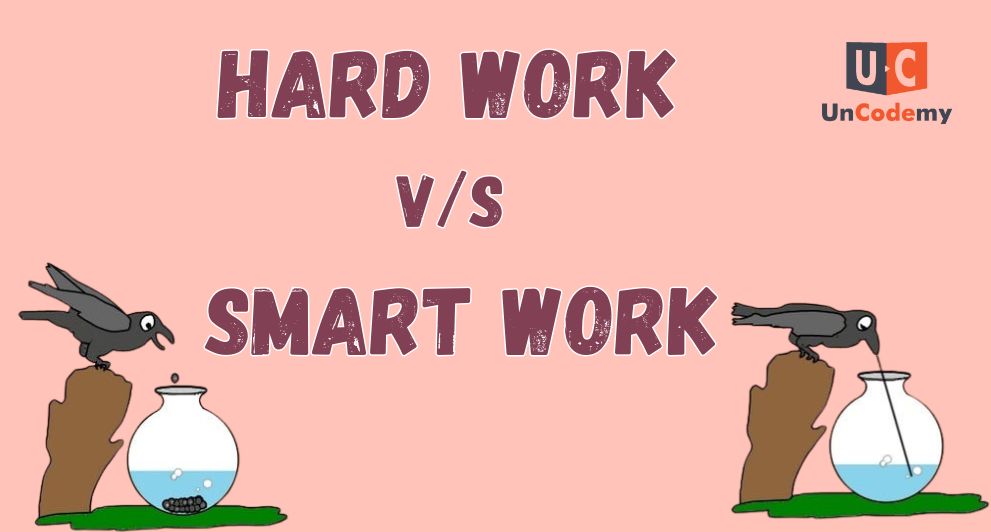Hard Work vs Smart Work: Key Differences, Approaches, Examples & Benefits



Smart work and hard work are both important, but they differ in how you approach tasks.
Hard work is all about putting in long hours and a lot of effort to get the job done. It’s about working hard, even if it means spending a lot of time on something. Smart work, on the other hand, focuses on getting the same amount of work done, but more efficiently—using less time or effort.
Here’s a simple breakdown of the differences:
Time: Hard work means you spend a lot of time on a task, while smart work is about completing the same work in less time.
Quality vs. Quantity: Hard work often focuses on doing more, sometimes sacrificing quality. Smart work aims to balance both quality and quantity.
Processes: Hard work usually means just getting things done, often without much thought about the best way to do them. Smart work involves thinking about how to improve the process—prioritizing, delegating, and managing your time well to get the best results.
Deadlines: While hard work can take a lot of time, making it tough to meet deadlines, smart work helps you finish tasks quicker and meet deadlines more effectively.
In short, both require dedication, but smart work helps you be more efficient, saving time and effort while maintaining quality.
| Aspect | Hard Work | Smart Work |
|---|---|---|
| Time | Long hours and effort to complete tasks | Same work completed in less time |
| Quality vs. Quantity | Focuses on quantity, sometimes sacrificing quality | Balances both quality and quantity |
| Process | Works without much thought about the method | Prioritizes, delegates, and manages time effectively |
| Deadlines | Can be harder to meet deadlines | Helps finish tasks quickly and meet deadlines |
Example #1
Task: You need to coordinate a meeting between CEOs from six tech start-ups, and it needs to happen next week.
Hard method: You do everything yourself—creating the invite list, drafting emails, writing the meeting agenda, inviting attendees, reserving a time that works for everyone, booking a suitable meeting venue, and organizing food, all while considering dietary preferences. It takes you around eight hours to complete all the tasks, but with other responsibilities to manage, it ends up taking you about two days to finalize everything.
Smart method: Instead of starting from scratch, you use a previous event invitation as a template (or find one online), only needing to update the date, guest list, and agenda. In the invitation, you ask attendees to share any dietary restrictions by the end of the day. While you wait for their responses, you can quickly book the venue and update the invitation once the location is confirmed.
Example #2
Task: Coordinate a fundraising campaign for your organization’s new sports program for at-risk youth.
Hard method: You take on the entire responsibility yourself—buying TV ad space, shooting the commercial, planning a letter-writing campaign, and organizing an event to celebrate volunteers and donors. This requires full-time dedication, as it involves intense project management and content creation.
Smart method: Instead of doing everything yourself, you hire a freelance videographer to handle the TV ad, which saves you time and leverages their technical skills. This allows you to focus on the fundraising letters and event planning while maintaining a healthier work-life balance throughout the campaign, helping you avoid burnout or mental fatigue.
Combining hard work with smart work brings out the best of both approaches, allowing you to achieve greater success in a more efficient and effective manner. Here are the key benefits of this combination:
By blending hard work with smart work, you can achieve high levels of productivity without burning out. Hard work ensures you’re putting in the effort, while smart work ensures that effort is focused on the right tasks that create the most value. This way, you’re not just working hard but working on the right things, making every hour count.
Smart work encourages strategic planning and prioritization. When you combine this with hard work, you focus your efforts on high-impact tasks, reducing time wasted on less important activities. The result is working more efficiently and achieving better outcomes with less effort.
Hard work is crucial for putting in the necessary effort, but when you couple it with smart work—such as leveraging tools, delegating tasks, or optimizing workflows—you’ll reach your goals faster. Smart strategies guide your hard work, accelerating progress without unnecessary delays.
Smart work involves critical thinking, analysis, and strategic planning. By using these approaches, combined with the discipline of hard work, you make more informed decisions that lead to greater long-term success. This helps you avoid mistakes and capitalize on opportunities that bring the most value.
Hard work helps you stay committed and diligent, but smart work ensures that you’re building something sustainable. By leveraging resources (time, people, money) effectively and staying focused on high-value tasks, you create lasting impact and value in your career or business.
Working smarter allows you to manage your time and energy more effectively, which helps in maintaining a healthier work-life balance. Instead of spending excessive hours on unimportant tasks, you can focus on what really matters, leaving room for personal time without sacrificing success.
When you combine the discipline of hard work with the strategic mindset of smart work, you’re better positioned to scale. You’ll learn to delegate, automate, and optimize processes, making it easier to grow your efforts, whether in a career or business. This balance sets you up for exponential growth.
Hard work often fosters persistence, but it’s the smart work component that encourages creativity and innovation. By allowing time for brainstorming, strategic thinking, and experimenting with new ideas, you can enhance your creative output while still putting in the necessary effort to bring those ideas to fruition.
By working smart, you prioritize tasks that lead to greater value creation, delivering more significant outcomes. When paired with hard work, this leads to higher earnings—whether through promotions, higher-paying jobs, or the successful launch of new projects or businesses.
Smart workers who combine effort with strategy are seen as highly competent, capable individuals. This builds respect and enhances your reputation, both in the workplace and in your personal network, opening up more opportunities for growth and advancement.
To Work Smart, Make Your Brain Work Hard

In today’s world, creativity is the key to success. To thrive in a creative society, your mind needs to be sharp and adaptable. Both the analytical and creative sides of your brain play a crucial role, so it’s important to constantly challenge yourself and keep learning.
Smart workers know the value of their skills and invest time and effort into improving them. They read, stay curious, and make sure they’re resourceful and capable in practical ways. Whether through formal education or self-learning, they focus on gaining useful knowledge and abilities.
As the saying goes, “You can never be overpaid, overdressed, or overeducated.”
If you want to work smarter:
To work both hard and smart, setting clear goals is essential. Before diving into any big project, make sure you and your team understand the purpose behind the work and have a solid plan to follow. This avoids wasting time on confusion or unnecessary debates.
The SMART goal method is a great way to keep your efforts focused and effective. SMART stands for:
Hard work is still important, but smart work means making that effort count. Efficiency is key, and learning to manage your time, work effectively, and focus on the right tasks will make all the difference.
Balancing hard work with smart planning helps you achieve more with less stress, leading to better results without burning out. Using time wisely and keeping your health in check is crucial to long-term success.
As a smart worker, it’s essential to combine hard work with a strategic focus on your strengths while managing your weaknesses effectively.
By blending hard work with smart strategies to build on strengths and address key weaknesses, you can create a path to more efficient and impactful success.
Prioritizing the creation, delivery, and capture of value is key to working both hard and smart. It’s not about staying busy or checking off tasks—it’s about focusing your energy on activities that have the highest return.
Instead of being busy with every task, smart workers prioritize the 20% of actions that lead to 80% of their success. They know where to direct their hard work for maximum impact and delegate or eliminate everything else. By combining hard work with smart choices, they focus their energy where it matters most—creating, delivering, and capturing value.
To work both hard and smart, you need control—over yourself, your work, and your path. Smart workers understand that having control lets them make the best decisions, reduce reliance on others, and maximize their potential.
Here’s how you can combine hard work with smart work by taking charge:
By combining hard work with smart decisions, you take charge of your life and work in ways that help you succeed and grow.
Both hard work and smart work are essential for success. Hard work builds foundational skills, discipline, and resilience, while smart work focuses on efficiency, innovation, and strategic planning. By combining the two, individuals can maximize their productivity, achieve faster results, and avoid burnout. Embracing both approaches allows for optimal growth, adaptability, and long-term success in any field.
Hard work involves consistent effort, while smart work focuses on achieving results efficiently through prioritization and innovation. A balance of both leads to success.
No, hard work is still essential for building skills and resilience. Combining it with smart work ensures efficiency and productivity.
No, smart work cannot fully replace hard work. It optimizes processes, but dedication and effort from hard work remain essential for long-term success.
Smart work involves creativity, adaptability, spontaneity, and continuous learning.
Both are effective depending on the task. Hard work builds foundational skills, while smart work boosts efficiency through planning and innovation.
Yes, smart work speeds up results by prioritizing impactful tasks and eliminating unnecessary ones, though it builds on the foundation of hard work.
Hard work: manually solving complex problems.
Smart work: using tools like calculators or identifying shortcuts to simplify tasks.
Hard work builds discipline, resilience, and deep understanding, laying the foundation for smart work strategies to succeed.
It can lead to inefficiency, burnout, and missed opportunities for smarter approaches. Smart work complements hard work for better outcomes.
Technology streamlines tasks with tools for automation, organization, and collaboration, enhancing efficiency and productivity.
Personalized learning paths with interactive materials and progress tracking for optimal learning experience.
Explore LMSCreate professional, ATS-optimized resumes tailored for tech roles with intelligent suggestions.
Build ResumeDetailed analysis of how your resume performs in Applicant Tracking Systems with actionable insights.
Check ResumeAI analyzes your code for efficiency, best practices, and bugs with instant feedback.
Try Code ReviewPractice coding in 20+ languages with our cloud-based compiler that works on any device.
Start Coding TRENDING
TRENDING BESTSELLER
BESTSELLER BESTSELLER
BESTSELLER TRENDING
TRENDING HOT
HOT BESTSELLER
BESTSELLER HOT
HOT BESTSELLER
BESTSELLER BESTSELLER
BESTSELLER HOT
HOT POPULAR
POPULAR